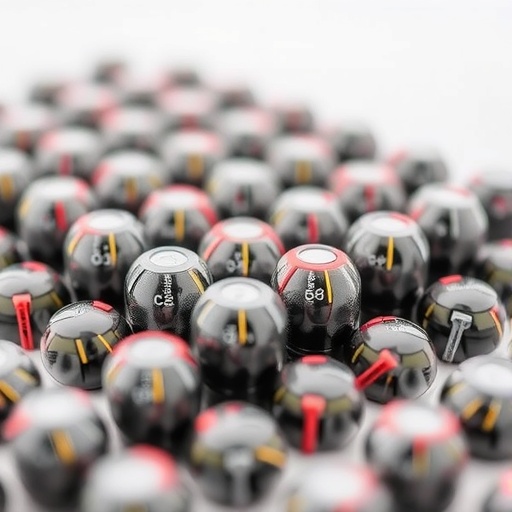In the ever-evolving field of energy storage, researchers are continuously exploring innovative materials that can enhance the performance of supercapacitors. The latest study from a team of scientists led by Shoba, J., and including notable researchers Sakthivel, K., and Maruthamuthu, S., has unveiled promising findings regarding the synthesis and characterization of MoS2 embedded BiVO4 mixed metal oxides. This work, published in the journal Ionics, highlights the potential of these composites in supercapacitor applications, offering insights that may fundamentally alter the landscape of energy storage solutions.
The work begins by addressing the pressing need for high-performance energy storage systems, particularly supercapacitors, which are heralded for their rapid charge-discharge cycles and long lifespan. Traditional materials used in supercapacitor electrodes, while effective, are often limited in their energy density. The introduction of transition metal oxides, particularly BiVO4, is noted for its favorable electrochemical properties. This research explores the embedding of MoS2, a two-dimensional material known for its remarkable electrical conductivity, into this matrix to further enhance performance.
The synthesis protocol established in the study demonstrates a unique approach to producing these mixed metal oxides. The researchers meticulously detail the methods used to combine MoS2 with BiVO4, emphasizing control over particle size and distribution. This is crucial as it directly influences the surface area available for electrochemical reactions. The study documents various temperature settings and reaction times that optimize the material’s characteristics, resulting in a composite that seemingly strikes a balance between conductivity and structural integrity.
Subsequently, the structural and morphological properties of the synthesized materials were scrutinized using sophisticated techniques, such as X-ray diffraction (XRD) and scanning electron microscopy (SEM). The XRD patterns revealed a crystalline structure, indicative of successful synthesis, while SEM images showcase the nanoscale morphology of the composites, essential for maximizing surface interaction during charge storage. This level of detail is paramount for scientists aiming to reproduce these results in further investigations or real-world applications.
Understanding the electrochemical features of these materials is equally important. The researchers employed electrochemical impedance spectroscopy (EIS) and cyclic voltammetry (CV) to evaluate the performance of the MoS2-BiVO4 composites. These methods allowed the team to draw correlations between the electrochemical activity and structural properties effectively. The findings revealed enhanced charge storage capabilities, suggesting that the introduction of MoS2 contributes to improved conductivity and faster ion transport, ultimately leading to a more efficient supercapacitor.
In terms of practical applications, the implications of this research cannot be understated. As cities grow and the demand for energy storage solutions escalates, the need for materials capable of supporting high-performance applications becomes critical. This research opens avenues for future work focusing on integrating these composites into commercial supercapacitor designs, potentially impacting the renewable energy sector as well as electric vehicles, where rapid energy release and recharge are essential.
Moreover, the exploration into the long-term stability of the composites indicates that the inclusion of MoS2 helps mitigate issues related to material degradation over time. By establishing the durability of the MoS2-BiVO4 mixtures through accelerated aging experiments, the researchers affirm their potential for sustained performance in real-world applications. This factor is often a significant hurdle for materials tested only under ideal laboratory conditions.
As the scientific community seeks to address climate change and reduce reliance on fossil fuels, advancements like those presented in this study become increasingly valuable. The development and optimization of supercapacitor technology can facilitate energy storage solutions that complement renewable sources such as solar and wind power, thus contributing to a more sustainable future.
In conclusion, the research conducted by Shoba and colleagues represents a noteworthy step forward in the field of energy storage materials. By embedding MoS2 within BiVO4 mixed metal oxides, they present a composite that not only enhances electrochemical performance but also stabilizes over time, essential for practical applications. As this line of research continues to evolve, the implications span beyond academia, holding potential ramifications for a variety of industries concerned with energy efficiency and sustainability.
Ultimately, this innovative work sheds light on the future of supercapacitor materials, paving the way for more efficient technologies in energy storage that could be pivotal in the fight against climate change. With ongoing explorations and refinements, the researchers raise hope for a new generation of energy solutions that combine the power of advanced materials science with the pressing needs of our planet.
The findings of the team underscore the innovative spirit of research in materials science as they bridge the gap between theoretical exploration and practical application. As this research garners attention, it may well inspire further studies that build on their methodologies and findings, fostering advancements in energy storage technology and contributing positively to our environmental challenges.
In the world of science, breakthroughs often rely on the collaboration of interdisciplinary teams. The endeavor by Shoba, J. and associates represents not only a technical achievement but also highlights the importance of collective effort in tackling complex problems. Their contributions to the realm of supercapacitor technology symbolize a significant milestone, a testament to the power of scientific inquiry.
Subject of Research: MoS2 embedded BiVO4 mixed metal oxides for supercapacitor applications.
Article Title: MoS2 embedded BiVO4 mixed metal oxides: Synthesis, structural, morphological and electrochemical features towards supercapacitor applications.
Article References:
Shoba, J., Sakthivel, K., Maruthamuthu, S. et al. MoS2 embedded BiVO4 mixed metal oxides: Synthesis, structural, morphological and electrochemical features towards supercapacitor applications.
Ionics (2025). https://doi.org/10.1007/s11581-025-06810-3
Image Credits: AI Generated
DOI: 04 November 2025
Keywords: supercapacitors, energy storage, MoS2, BiVO4, mixed metal oxides, electrochemistry, renewable energy.
Tags: advancements in energy storage solutionselectrochemical properties of BiVO4energy density improvement in supercapacitorsenergy storage innovationshigh-performance supercapacitorsmethods for mixed metal oxide productionMoS2/BiVO4 mixed metal oxidesparticle size control in synthesisrapid charge-discharge cyclessupercapacitor performance enhancementsynthesis of transition metal oxidestwo-dimensional materials in energy storage





